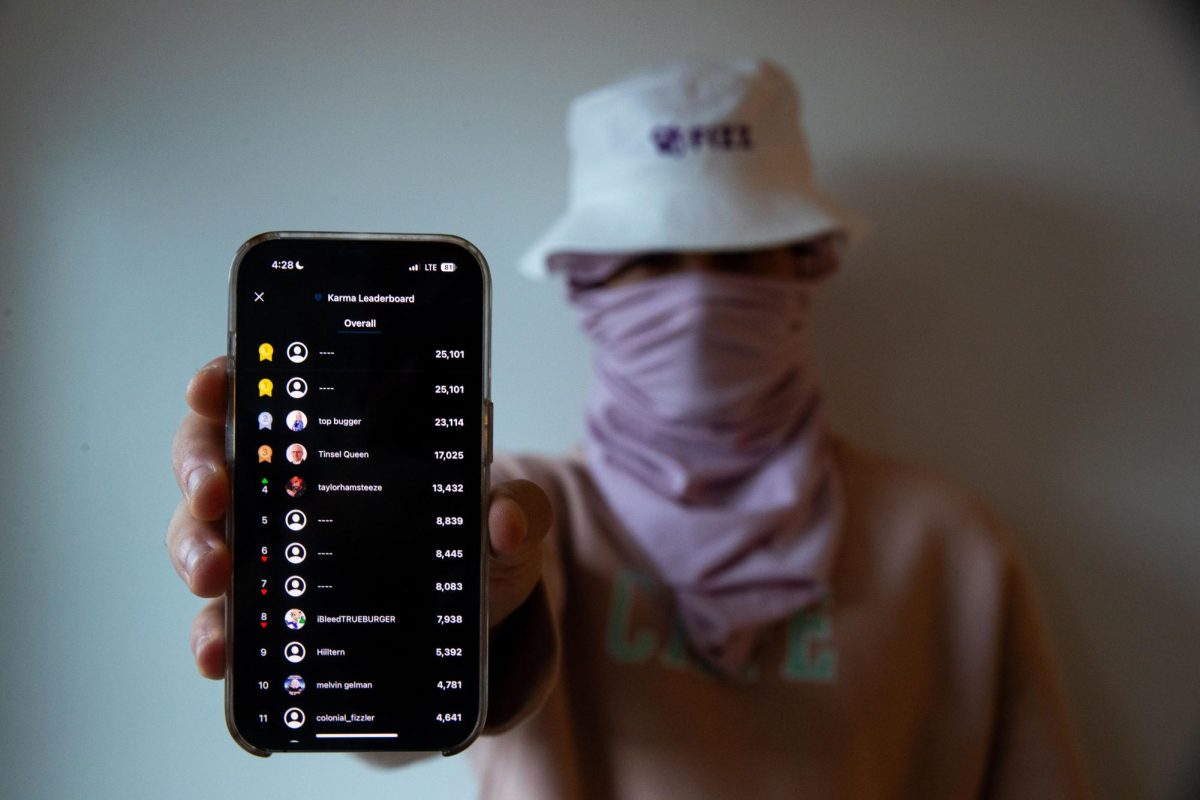Students are buzzing about an anonymous college-based social media app after similar apps lost popularity among users.
Fizz allows students to anonymously post memes, GIFs and funny messages with their peers, requiring users to verify their account through their school email. Fizz users said the app has the potential to surpass the lifespans of comparable apps, like Jeti and Yik Yak, because of its competitive nature and community building through comedy.
After opening the app, users are first greeted with three categories of posts: “New,” “Fizzin,” or trending posts, and “Top,” which displays the posts with the most upvotes. Users — which the app labels as anonymous unless the individual chooses a pseudonym to post under — can share content under 200 characters and include pre-uploaded memes and gifs as well as media from their camera roll in their posts. Users are also able to categorize their posts with handles like “Question” or “Crush.”
A junior who posts under the screen name “Tinsel Queen” said as a first-year she used Jeti, an app based on location rather than school affiliation, and Yik Yak, which includes college-based and niche communities for all users to join. But she said the apps’ popularity fizzled away among students because they didn’t have the same “sense of community” as Fizz.
Tinsel Queen said the Fizz interface — specifically its ranking systems of top users and posts — filters the most popular content from less funny posts. She added that some content on former apps had “no structure” and included sex-related spam.
“What sets Fizz apart is partially that they pull out the funniest content from the day into the Fizzin’ category,” she said. “So that way you can see things that are funny and engaging versus Yik Yak and Jeti you might have to scroll through a lot of not-so-good content to get to the funny stuff.”
She said the app’s use of upvotes encourages users to make content they believe others will like and makes the app more competitive than its predecessors.
“It’s how good jokes are made,” Tinsel Queen said. “The best posts on Fizz get over 1,000 upvotes so even if it is inauthentic, it’s definitely engaging for the people.”
Tinsel Queen said she sees the app staying active until at least throughout the school year, given its count of more than 2,000 users. She said when news happens on campus, people talk about it on Fizz, including people who are less engaged on the app.
She added that the app’s longevity depends on Fizz’s marketing team and how much they engage with the upcoming class of first-years.
A top Fizz user said while Fizz primarily has comedic content, more serious conflicts and questions have surfaced, like people confessing to cheating on their partners. The user said the anonymity of the app holds Fizz back from truly being a real-life community.
“Being around other people, as social creatures, is quite important for us as humans,” the user said. “If your only source of community is through online, that’s how you develop a lot of other unhealthy habits and I don’t think you would want people not leaving their dorm room because they feel like their community is Fizz.”
The user said when first starting on the app, he would post spontaneously but started to think “a very little bit” about how to have well-performing posts in the future. The user said they received advice from his roommates when they made the decision to grow on the leaderboard of top users.
“We found that if you reply to people that are sh*t talking, and not in an aggressive way, but in a poking fun of them and turning that insult to be at their expense kinda way, those usually do really well,” the user said.
The user said the comedic nature and inclusivity of all grade levels sets Fizz apart from other social media apps, the GW subreddit and the Snapchat stories for specific grades.
“This definitely gives me a better idea of the whole GW community, since there are seniors, freshmen, juniors and sophomores on it,” the source said.
Jay Khurana, a junior and a moderator on the app, said he posts roughly 30 times a day and reviews posts that users flag as possible violations of the app’s terms and conditions, like bullying or promoting illegal activity.
“We only take down stuff that really crosses the line,” Khurana said.
Jacob DiDonato, a first-year majoring in international affairs, said he learned about the app when he was coming home from dinner and his friend showed him a meme he posted on the app. He added that the app’s college-based setup makes the app “more community-oriented” and relatable.
DiDonato said he thinks the anonymity of users on the app allows users to be “more open” but that people also post content that is “a bit too out there.”
“McReynolds closing would be my 9/11,” a recent post read.
DiDonato said after a homicide suspect escaped custody on campus and triggered a shelter-in-place order earlier this month, users made light of the situation, with some changing their username from “Anonymous” to “Dangerous individual” and posting jokes while impersonating the suspect.
“One of them was like, ‘Just got out of the GW Hospital, what’s up?’ or something like that,” DiDonato said.
Zephyr Flanigan, a junior majoring in political science, said the anonymous nature of the app allows students to post without judgment but worries some might take advantage of it to post offensive content.
“It can lead to potentially problematic things where people will say very offensive or bigoted things, knowing that there won’t be any repercussions because their identity is anonymous,” Flanigan said.
Flanigan said she hopes more people will use the app and the community grows as opposed to previous college-based apps, like Jeti.
“I hope that there’s a strong, continuous use throughout the coming months, years, weeks,” Flanigan said.





